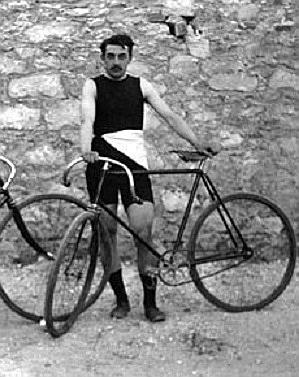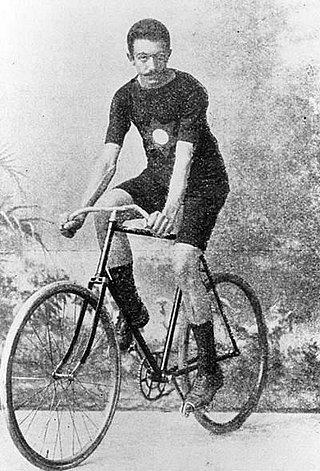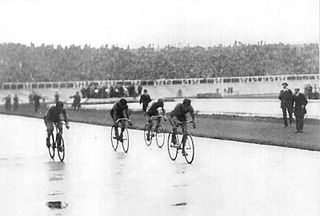
The 1896 Summer Olympics, officially known as the Games of the I Olympiad and commonly known as Athens 1896, was the first international Olympic Games held in modern history. Organised by the International Olympic Committee (IOC), which had been created by French aristocrat Pierre de Coubertin, it was held in Athens, Greece, from 6 to 15 April 1896.

The 1900 Summer Olympics were held as part of the 1900 World's Fair, during which many cycling events were contested. The IOC website currently affirms a total of 3 medal events, after accepting, as it appears, the recommendation of Olympic historian Bill Mallon regarding events that should be considered "Olympic". These additional events include the men's points race. Thus, three cycling events are considered Olympic events. These three competitions were held between 9 September and 16 September 1900. The cycling part of the World's Fair included 250 competitors, 160 of them French. In the sprint and 25 km events, 72 competitors, all men, from seven nations competed.

The men's points race in cycling at the 2004 Summer Olympics consisted of a 160 lap points race with 16 sprints where points were awarded. The event was held on 24 August 2004 at the Athens Olympic Velodrome. There were 23 competitors from 23 nations, with each nation limited to one cyclist in the event. The event was won by Mikhail Ignatiev of Russia, the nation's first victory in the men's points race. Spain's Joan Llaneras, the defending champion, took silver; he was the first and only person to win multiple medals in the relatively short-lived points race, and ended with three medals after another gold in 2008. Guido Fulst of Germany took bronze, the first medal in the event for that nation since 1900.
The men's track time trial in Cycling at the 2004 Summer Olympics was a time trial race in which each of the 17 cyclists from 13 nations attempted to set the fastest time for four laps of the track. Nations were limited to two cyclists each. The event was won by Chris Hoy of Great Britain, the nation's second consecutive victory in the men's track time trial. Arnaud Tournant of France earned silver after a disappointing fifth-place finish four years earlier. Stefan Nimke put Germany on the podium for the second consecutive Games with his bronze.

Paul Michel Pierre Adrien Masson was a French cyclist who raced at the 1896 Summer Olympics in Athens.

Felix Adolf Schmal was an Austrian fencer and racing cyclist. He was born in Dortmund and died in Salzburg. He competed at the 1896 Summer Olympics in Athens.

Marie Léon Flameng was a French cyclist and a World War I pilot. He competed at the 1896 Summer Olympics in Athens, winning three medals including one gold.

Three sportsmen from Austria competed at the 1896 Summer Olympics. Though Austria was then a part of Austria-Hungary, most sources separate Austrian competitors from the Hungarians at the 1896 Games.

France competed at the 1896 Summer Olympics in Athens, Greece, from 6 to 15 April 1896. French athletes had appeared in every Summer Olympic Games of the modern era, alongside Australia, Great Britain, and Greece. France won the fourth-most gold medals with 5 and the fourth-most total medals with 11. Cycling was the sport in which the French competitors had the most success, as they completely dominated the field. The French team had 27 entries in 18 events, winning 11 medals.

Greece was the host nation of the 1896 Summer Olympics held in Athens. The number of Greek contestants is commonly cited as 169, but as many as 176 Greeks contested events in all nine sports. The Greeks were by far the most successful nation in terms of total medals with 47, 27 more than the United States of America. Nevertheless, their number of first-place finishes (10) was one fewer than the Americans' 11. The Greeks had 172 entries in 39 events. Only 4 events had no Greek entrants—the 400 metres and the high jump in athletics and the vault and the team horizontal bar in gymnastics.

The first heat of the men's 100 metres race was the first event run at the modern Olympics, on 6 April 1896. The event consisted of 3 heats and a final, held on 10 April. The 100 metres was the shortest race on the Athletics at the 1896 Summer Olympics programme. 15 athletes from 8 nations competed. The event was won by Thomas Burke of the United States. Fritz Hofmann of Germany took second, with Hungarian Alajos Szokolyi and American Francis Lane tying for third. These competitors are recognized as gold, silver, and bronze medalists by the International Olympic Committee, though that award system had not yet been implemented in 1896.

The men's 1500 metres race, the longest flat-track race of the 1896 Summer Olympics programme, was the last event on 7 April. It was run in a single heat, with eight athletes competing.

The men's time trial was one of 5 track cycling events on the Cycling at the 1896 Summer Olympics programme. It was the fourth event on the cycling schedule and was held on 11 April. The first time trial competition was the only time that Olympic time trials were held over the distance of one-third of a kilometre; when the event returned to the programme at the 1928 Summer Olympics the distance was set at one kilometre.

The men's 10 kilometres was one of the five track cycling races on the Cycling at the 1896 Summer Olympics programme. It was held on 11 April and comprised 30 laps of the track. The 1896 Games was the only time that the 10 kilometres track race was part of the cycling program at an Olympic Games. Six cyclists from four nations competed. The event was won by Paul Masson of France, the second of his three victories that day. His countryman Léon Flameng finished second, while Austrian Adolf Schmal was third.

The men's 100 kilometres was one of five track cycling events on the Cycling at the 1896 Summer Olympics programme. It was the first race held, on 8 April. It required cyclists to complete 300 circuits of the track. Nine cyclists from five nations competed. The event was won by Léon Flameng of France, with Georgios Kolettis of Greece coming in second.

The men's 12 hour race was one of five track cycling events on the Cycling at the 1896 Summer Olympics programme. It was the final event of the 1896 Summer Olympics, ending at 5 p.m. on 13 April. Seven cyclists from four nations started. The event was won by Adolf Schmal of Austria, the only gold medal in cycling ever won by the nation, until Anna Kiesenhofer's win in the 2020 Women's Road Race. Schmal lapped silver medalist Frederick Keeping of Great Britain early, winning by that lap as the two were the only riders to finish. The 12 hour race was the last event to finish at the 1896 Games.

The men's road race was the only road cycling event on the Cycling at the 1896 Summer Olympics programme. The course was 87 kilometres long and the race was held on 12 April. Seven cyclists from three nations competed. The event was won by Aristidis Konstantinidis of Greece. August von Gödrich of Germany took second, while Edward Battell finished third.

The men's sprint was one of the three cycling events, all track cycling, now regarded as "Olympic" on the Cycling at the 1900 Summer Olympics programme. It was held on 11 September and 13 September. The sprint, a 2000-metre race with 1000-metre heats, was conducted in four rounds. 69 of the 72 cyclists competed in the sprint, including cyclists from all six competing nations. The event was won by Albert Taillandier of France, with his countryman Fernand Sanz in second place. John Henry Lake of the United States won the nation's first cycling medal with his bronze.

The men's 25 kilometres was one of three cycling events, all track cycling, on the Cycling at the 1900 Summer Olympics programme that were open to all amateurs, had more than one nation participating and no handicapping. It was held on 15 September. Ten cyclists competed. Four had already competed in the sprint event. The result of the race proved Louis Bastien of France to be the top long-distance cyclist present, while Lloyd Hildebrand finished in second and Auguste Daumain in third. One of the contestants, Louis Trousselier, would go on to win the 1905 Tour de France. Prizes were awarded to the top four finishers: art objects valued at 400 francs, 300 francs, 200 francs (third), and 100 francs (fourth).

The men's 100 kilometres was one of seven track cycling events on the Cycling at the 1908 Summer Olympics programme. Its distance was the longest of the individual event distances. A challenge cup was presented by the Prince of Wales to the winner. There were 43 competitors from 11 nations. Each nation could enter up to 12 cyclists. The event was won by Charles Henry Bartlett of Great Britain, with his countryman Charles Denny finishing second. Octave Lapize earned bronze, making France the only nation to have medalists at both appearances of the 100 kilometres race.

















